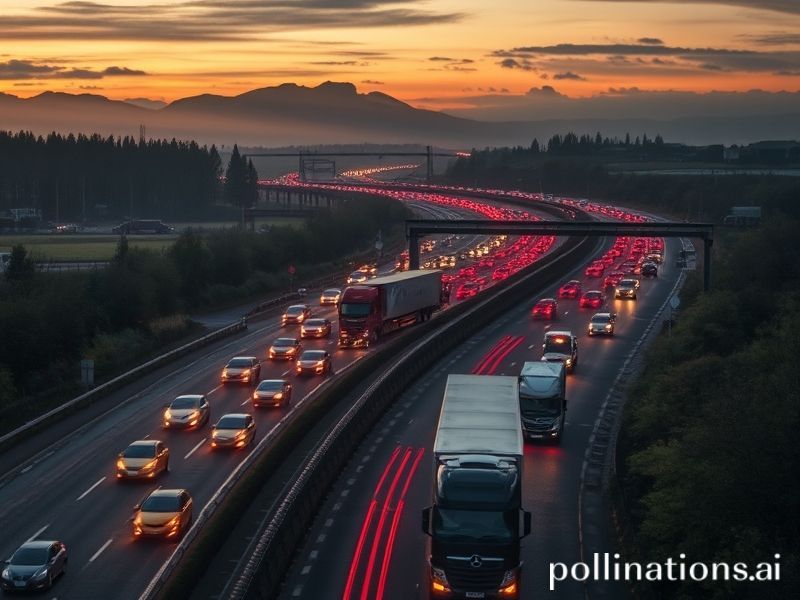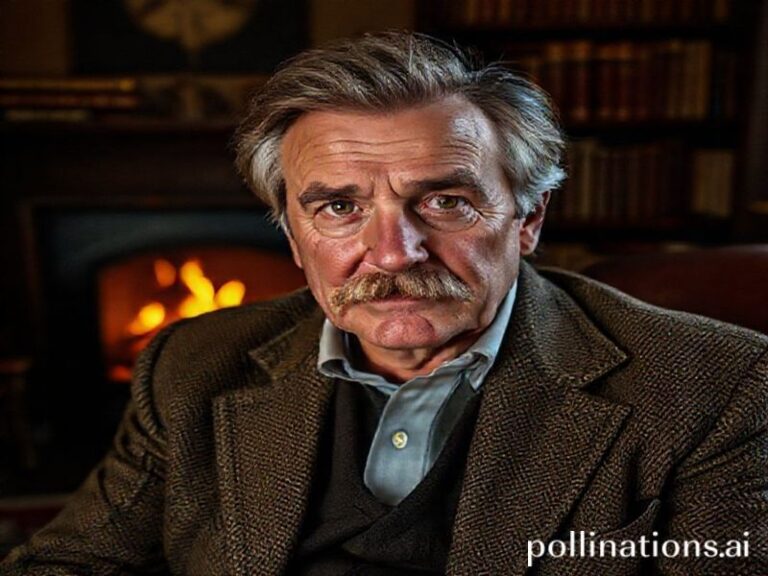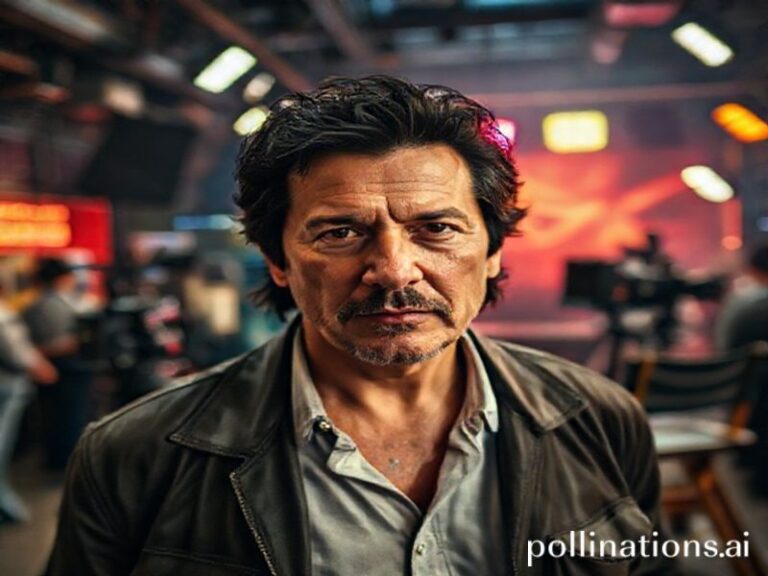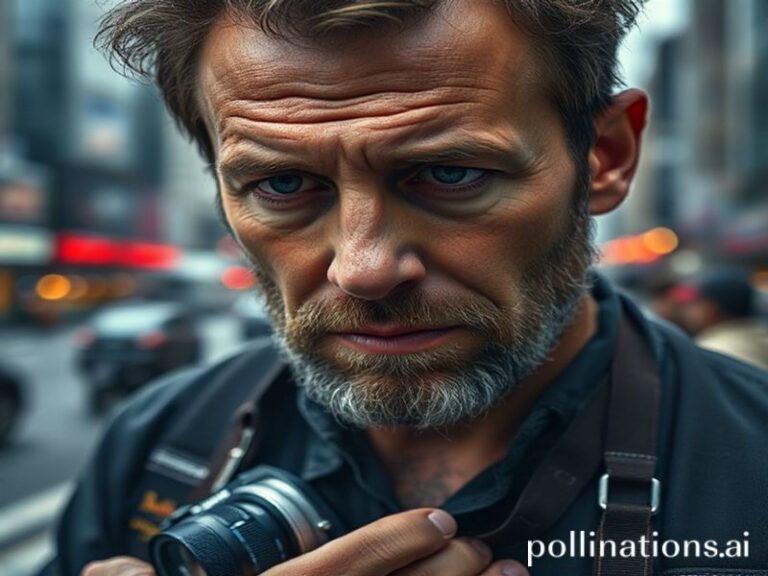From Leeds to the World: How a Yorkshire Tea Spill Turned the M62 into Global Gridlock Theatre
M62 Traffic: The World’s Longest, Most Expensive Parking Lot and What It Says About Civilisation
By Dave’s International Affairs Correspondent, filing from somewhere between Leeds and irrelevance
Tonight, somewhere in West Yorkshire, a Latvian lorry driver named Igors is eating cold pierogi out of a thermos while stationary on the M62. His artic is carrying high-vis jackets to Manchester; unfortunately, he is now wearing one just to be seen above the fog of diesel idling. Igors is not alone. He is part of the M62’s latest trans-continental tailback—a 15-mile sculpture of steel, frustration, and existential dread that doubles, on quiet days, as Britain’s most reliable piece of performance art.
Viewed from orbit, the M62 traffic looks less like a motorway and more like a luminous vein thrombosis on the planet’s pale limb. Satellite imagery shared on Chinese social media app Weibo last week drew 1.3 million likes and the caption: “Even our Guangzhou ring road at Lunar New Year feels inadequate now.” In Delhi, Uber drivers WhatsApp each other memes of the queue: a single file of brake lights receding to infinity, captioned “British queueing finally weaponised.” The M62 has, without meaning to, become Brexit Britain’s unsolicited soft-power export: a living diorama of gridlock chic that foreigners rubberneck at the way we once gawked at their famines.
The immediate trigger for this week’s epic stasis was mundane enough: a jack-knifed tanker spilling 32,000 litres of Yorkshire Tea (milk already added, reportedly). Yet beneath that banal incident runs a darker global current. The same supply-chain ballet that choreographs lithium from Chile to Shenzhen, then finished iPhones to Leeds Trinity shopping centre, now pirouettes around a single overturned beverage truck. One errant teapot and the choreography collapses into interpretive dance performed entirely with hazard lights.
Economists at the IMF have begun calling the M62 “the Strait of Hormuz of the North,” arguing that every additional hour Igors spends marinating in diesel fumes knocks 0.0002% off EU–UK trade volume. You can almost hear Brussels updating its PowerPoint: “Lesson 47—Never let an island nation route 40% of its freight through a glorified goat track.” Meanwhile, the Bank of Japan has quietly hedged yen exposure to Yorkshire pudding futures. Nothing says late-stage capitalism like financial instruments based on whether Sharon in Huddersfield can still buy Aunt Bessie’s on Friday.
Environmentalists offer the obvious sermon: that 50,000 idling engines are currently exhaling enough CO₂ to make Tuvalu reconsider cartography classes. Greta Thunberg retweeted a photo of the jam with the single word “congratulations,” which, in Swedish sarcasm, registers as a war crime. China has offered to send 300 electric buses to shuttle stranded drivers; Whitehall politely declined, citing “sovereignty,” then privately asked if they come with cup holders.
Human stories bubble up like methane from landfill. A wedding convoy—complete with ribboned Rolls-Royce—has turned the hard shoulder into an impromptu reception. Guests in morning suits queue at a Burger King wagon selling £9 prosecco in paper cups; the bride’s train now doubles as a picnic blanket. Overhead, a Ryanair flight to Alicante circles at 7,000 ft while the pilot informs passengers they’re technically overtaking traffic below. In row 12, someone starts a sweepstake on which lane will move first. The under-11 football team from Hull, due in Liverpool for a tournament, have repurposed the central reservation as a pitch. FIFA is reportedly considering the offside rule modifications.
And yet, amid the chaos, a certain cosmopolitan camaraderie forms. Igors swaps pierogi for a Ghanaian driver’s jollof; a Polish HGV teaches a Geordie van man how to swear in four Slavic languages. Someone has set up a makeshift cinema on a flatbed, projecting “Mad Max: Fury Road” onto the side of a DHL trailer—audience participation involuntary. The UN High Commissioner for Refugees, ever alert to new camps, is rumoured to be sending observers with clipboards and branded fleece.
By dawn the tea has congealed into a beige glacier, Highways England has announced “recovery efforts ongoing,” and Igors finally rolls forward thirty feet before braking again. The Latvian logs the delay under “Force Majeure—British.” Analysts will later call it a minor blip; poets may call it a metaphor. Either way, the world keeps turning, slowly, in first gear.
Conclusion: The M62 traffic jam is not merely a British inconvenience; it is a planetary parable. It demonstrates how fragile our just-in-time civilisation really is, how quickly courtesy mutates into cannibalism, and how even the most localised snarl-up reverberates from TikTok feeds in Taipei to boardrooms in Basingstoke. Next time you’re stuck, remember: you are not alone. You are merely the latest extra in humanity’s long-running tragicomedy, now playing in a lay-by near Huddersfield. Curtain never falls; tail-lights never fade.







